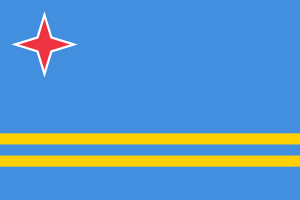Difference between revisions of "Language/Papiamento/Vocabulary/How-to-Say-Hello-and-Greetings"
< Language | Papiamento | Vocabulary
Jump to navigation
Jump to search
m (Quick edit) |
|||
| (12 intermediate revisions by 2 users not shown) | |||
| Line 1: | Line 1: | ||
[[File:greetings-say-hello-polyglot-club.png|thumb]] | [[File:greetings-say-hello-polyglot-club.png|thumb]] | ||
[[File:Aruba-Timeline-PolyglotClub.png|thumb]] | [[File:Aruba-Timeline-PolyglotClub.png|thumb]] | ||
<div class="pg_page_title">🤗 '''Papiamento''' Greetings for Everyday Life</div> | |||
<div | |||
Hi Papiamento learners! 😃 | Hi Papiamento learners! 😃 | ||
Papiamento is spoken in Aruba, Bonaire, and Curacao, which are Dutch territories located in the southern Caribbean. | |||
The people in these islands are generally very friendly and welcoming. When meeting someone for the first time, it is customary to shake hands and make eye contact. | |||
Papiamento is a language that has been influenced by Spanish, Portuguese, Dutch, and African languages, so you might notice similarities to those languages as well. | |||
Let’s get started! 🤗 | |||
__TOC__ | __TOC__ | ||
==Greetings== | ==Useful Greetings in Papiamento== | ||
{| class="wikitable sortable" | {| class="wikitable sortable" | ||
!'''English''' | !'''English''' | ||
| Line 45: | Line 42: | ||
|Bon bini | |Bon bini | ||
|- | |- | ||
|hello, hi | |||
|hallo, ki tin | |||
|- | |||
|How are you? | |||
|Con/Kon ta bay ? | |||
|- | |||
| | |||
* I am fine. | |||
* (very) Well | |||
| | |||
* Mi ta bon. | |||
* (mashá) Bon | |||
|- | |||
|sleep well | |||
|drumi dushi | |||
|- | |||
|goodbye | |||
|ayo | |||
|- | |||
|see you later | |||
|te aweró, | |||
te despues | |||
|- | |||
|good luck | |||
|suerte | |||
|- | |||
|please | |||
|por fabor, sea asina di | |||
|- | |||
|thank you | |||
|danki [NL: dank u] | |||
|- | |||
|(you're welcome) | |||
|di nada | |||
|- | |||
|don't mention it | |||
|na bo ordo | |||
|- | |||
|yes | |||
|si | |||
|- | |||
|no | |||
|no | |||
|- | |||
|I am sorry | |||
|Despensa mi | |||
|- | |||
|Excuse me | |||
|Despensa | |||
|- | |||
|Help! | |||
|Auxilio! Yuda mi! | |||
|- | |||
|a more casual way to say “Good morning” | |||
|Moro | |||
|- | |||
|How is life? | |||
|Con ta c’e bida? | |||
|- | |||
|Everything is alright | |||
|Tur cos ta bon | |||
|- | |||
|What’s your name? | |||
|Con yama bo? or Con bo nomber ta? | |||
|- | |||
|My name is… | |||
|Ami yama… or Mi nomber ta… | |||
|- | |||
|Where are you from? | |||
|Di unda bo ta? | |||
|- | |||
|I come from… | |||
|Mi ta bin(i) di… | |||
|- | |||
|I live in… | |||
|Mi ta biba na… | |||
|- | |||
|See you later | |||
|Te mas awero (Te’ oro) | |||
|- | |||
|Till the next time | |||
|Te despues | |||
|} | |||
==Videos== | |||
===Learning Papiamento in a few minutes === | |||
<youtube>https://www.youtube.com/watch?v=ZN8mkQVE6AE</youtube> | |||
===Learn Papiamento - Introducing Yourself === | |||
<youtube>https://www.youtube.com/watch?v=yqX_Xrt8HSQ</youtube> | |||
===Learn Papiamento - Useful words and Greetings=== | |||
<youtube>https://www.youtube.com/watch?v=kjSEnmtT8wQ</youtube> | |||
==Dialogue== | |||
Here's an example dialogue using some of the words we just learned: | |||
* Bon dia! | |||
Good day! | |||
* Con ta bai? | |||
How are you? | |||
* Mi ta bon, danki. | |||
I'm good, thank you. | |||
* Bon tardi! | |||
Good afternoon! | |||
* Te otro biaha! | |||
See you later! | |||
==Sources== | ==Sources== | ||
* https://en.wikipedia.org/wiki/Papiamento | |||
* https://www.omniglot.com/writing/papiamento.htm | |||
* | * https://www.listenandlearnusa.com/papiamento/phrases/basic-greetings/ | ||
* https://www.learn-papiamento.com/papiamento-phrases/ | |||
* https://www.speakpapiamento.com/common-papiamento-phrases/ | |||
* http://users.elite.net/runner/jennifers/ | |||
* https://nerdcoremovement.com/basic-phrases-in-papiamento/ | |||
* https://www.youtube.com/watch?v=ZN8mkQVE6AE | |||
* https://www.youtube.com/watch?v=yqX_Xrt8HSQ | |||
* https://www.youtube.com/watch?v=kjSEnmtT8wQ | |||
==Free Papiamento Lessons== | ==Free Papiamento Lessons== | ||
*'''[[Language/Papiamento/Grammar|Grammar Lessons]]''' | *'''[[Language/Papiamento/Grammar|Grammar Lessons]]''' | ||
*'''[[Language/Papiamento/Vocabulary|Vocabulary Lessons]]''' | *'''[[Language/Papiamento/Vocabulary|Vocabulary Lessons]]''' | ||
*'''[[Language/Papiamento/Pronunciation|Pronunciation Lessons]]''' | *'''[[Language/Papiamento/Pronunciation|Pronunciation Lessons]]''' | ||
*'''[[Language/Papiamento/Culture|Culture Lessons]]''' | *'''[[Language/Papiamento/Culture|Culture Lessons]]''' | ||
==Language Exchange== | ==Language Exchange== | ||
| Line 89: | Line 197: | ||
[[Category:Jennifers]] | [[Category:Jennifers]] | ||
==Other Lessons== | |||
* [[Language/Papiamento/Vocabulary/Colors|Colors]] | |||
* [[Language/Papiamento/Vocabulary/City|City]] | |||
* [[Language/Papiamento/Vocabulary/Vegetables|Vegetables]] | |||
* [[Language/Papiamento/Vocabulary/Sports,-Hobbies-and-Games|Sports, Hobbies and Games]] | |||
* [[Language/Papiamento/Vocabulary/Numbers|Numbers]] | |||
* [[Language/Papiamento/Vocabulary/Months-of-the-year|Months of the year]] | |||
* [[Language/Papiamento/Vocabulary/Location|Location]] | |||
* [[Language/Papiamento/Vocabulary/Post-Office|Post Office]] | |||
* [[Language/Papiamento/Vocabulary/Time|Time]] | |||
* [[Language/Papiamento/Vocabulary/Days-of-the-week|Days of the week]] | |||
<span links></span> | |||
Latest revision as of 12:23, 27 March 2023
🤗 Papiamento Greetings for Everyday Life
Hi Papiamento learners! 😃
Papiamento is spoken in Aruba, Bonaire, and Curacao, which are Dutch territories located in the southern Caribbean.
The people in these islands are generally very friendly and welcoming. When meeting someone for the first time, it is customary to shake hands and make eye contact.
Papiamento is a language that has been influenced by Spanish, Portuguese, Dutch, and African languages, so you might notice similarities to those languages as well.
Let’s get started! 🤗
Useful Greetings in Papiamento[edit | edit source]
| English | Papiamento |
|---|---|
| general greeting | Kon ta bai? |
| reply to Kon ta bai | Bon |
| morning greeting | Bon dia |
| afternoon greeting | Bon tardi |
| evening and nighttime greeting | Bon nochi |
| welcome greeting | Bon bini |
| hello, hi | hallo, ki tin |
| How are you? | Con/Kon ta bay ? |
|
|
| sleep well | drumi dushi |
| goodbye | ayo |
| see you later | te aweró,
te despues |
| good luck | suerte |
| please | por fabor, sea asina di |
| thank you | danki [NL: dank u] |
| (you're welcome) | di nada |
| don't mention it | na bo ordo |
| yes | si |
| no | no |
| I am sorry | Despensa mi |
| Excuse me | Despensa |
| Help! | Auxilio! Yuda mi! |
| a more casual way to say “Good morning” | Moro |
| How is life? | Con ta c’e bida? |
| Everything is alright | Tur cos ta bon |
| What’s your name? | Con yama bo? or Con bo nomber ta? |
| My name is… | Ami yama… or Mi nomber ta… |
| Where are you from? | Di unda bo ta? |
| I come from… | Mi ta bin(i) di… |
| I live in… | Mi ta biba na… |
| See you later | Te mas awero (Te’ oro) |
| Till the next time | Te despues |
Videos[edit | edit source]
Learning Papiamento in a few minutes[edit | edit source]
Learn Papiamento - Introducing Yourself[edit | edit source]
Learn Papiamento - Useful words and Greetings[edit | edit source]
Dialogue[edit | edit source]
Here's an example dialogue using some of the words we just learned:
- Bon dia!
Good day!
- Con ta bai?
How are you?
- Mi ta bon, danki.
I'm good, thank you.
- Bon tardi!
Good afternoon!
- Te otro biaha!
See you later!
Sources[edit | edit source]
- https://en.wikipedia.org/wiki/Papiamento
- https://www.omniglot.com/writing/papiamento.htm
- https://www.listenandlearnusa.com/papiamento/phrases/basic-greetings/
- https://www.learn-papiamento.com/papiamento-phrases/
- https://www.speakpapiamento.com/common-papiamento-phrases/
- http://users.elite.net/runner/jennifers/
- https://nerdcoremovement.com/basic-phrases-in-papiamento/
- https://www.youtube.com/watch?v=ZN8mkQVE6AE
- https://www.youtube.com/watch?v=yqX_Xrt8HSQ
- https://www.youtube.com/watch?v=kjSEnmtT8wQ
Free Papiamento Lessons[edit | edit source]
Language Exchange[edit | edit source]
Forum[edit | edit source]
Tools[edit | edit source]
Marketplace[edit | edit source]
Other Lessons[edit | edit source]
- Colors
- City
- Vegetables
- Sports, Hobbies and Games
- Numbers
- Months of the year
- Location
- Post Office
- Time
- Days of the week

